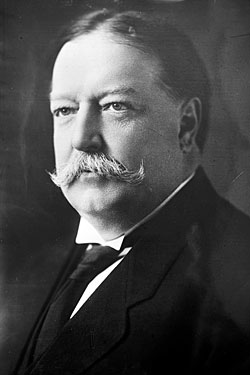The Politics of Imperialism
|
|
| William Howard Taft |
There was mixed sentiment about the way the United States had acquired land for the Panama Canal, and relations between the United States and Columbia were strained. During his presidency, Roosevelt frequently intervened in the affairs of Latin America under what is called the Roosevelt Corollary to the Monroe Doctrine. His declaration added that the United States would intervene and protect weaker nations from being overtaken by more powerful ones.
Roosevelt also earned a Nobel Peace Prize after he mediated a peace agreement between Russia and Japan to end a war between the countries in 1905. When William Howard Taft was elected president in 1908, he continued Roosevelt’s strong foreign policy. Taft used what became known as “dollar diplomacy.” Instead of using the military to back his foreign policy, he increased the United States’ investments in the economies of Asia and Latin America. For instance, Taft sent troops to restore peace in Nicaragua when insurrection broke out in 1909. He encouraged bankers in the United States to extend loans to the new government. When the new government again faced insurrection, American banks began to lose money, and the United States moved in to occupy Nicaragua for more than ten years; Taft’s investment in the country was not entirely profitable for the United States.
